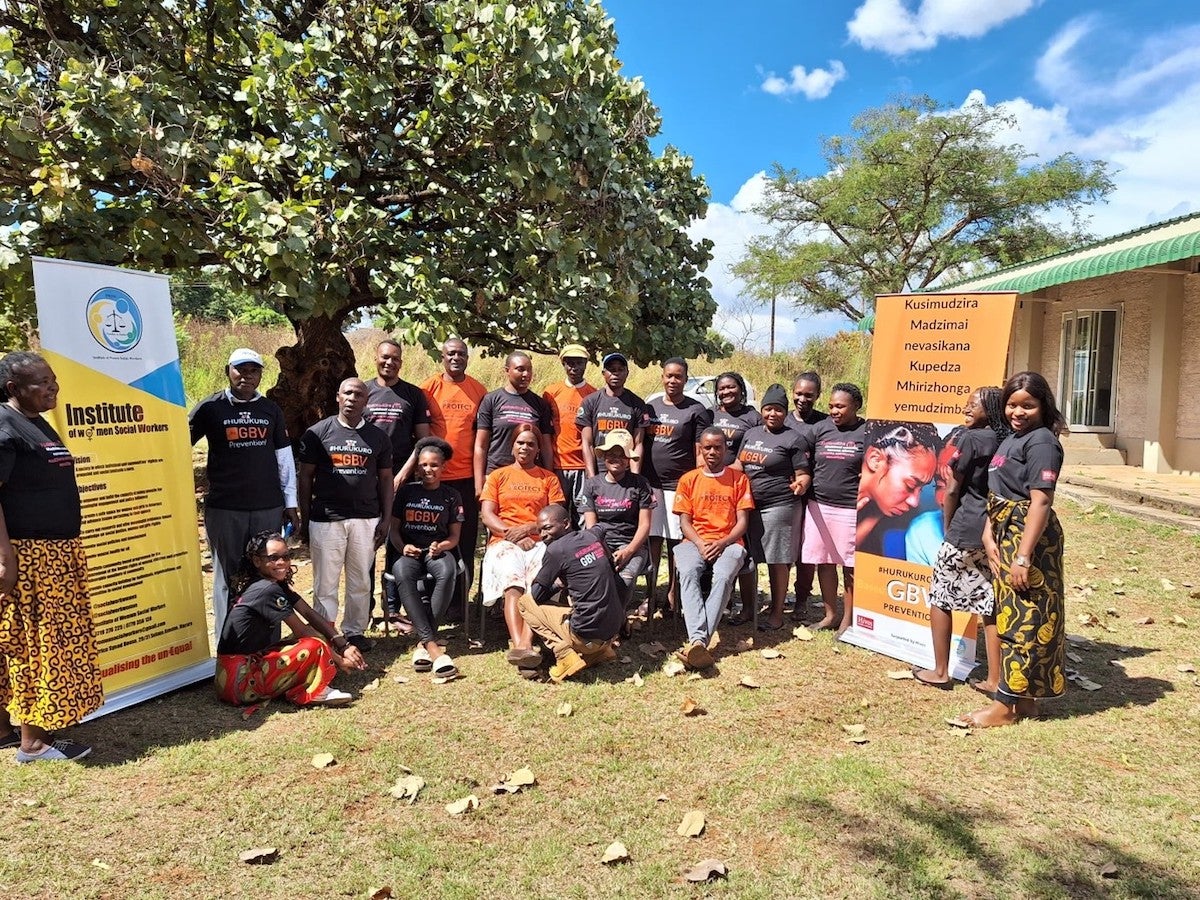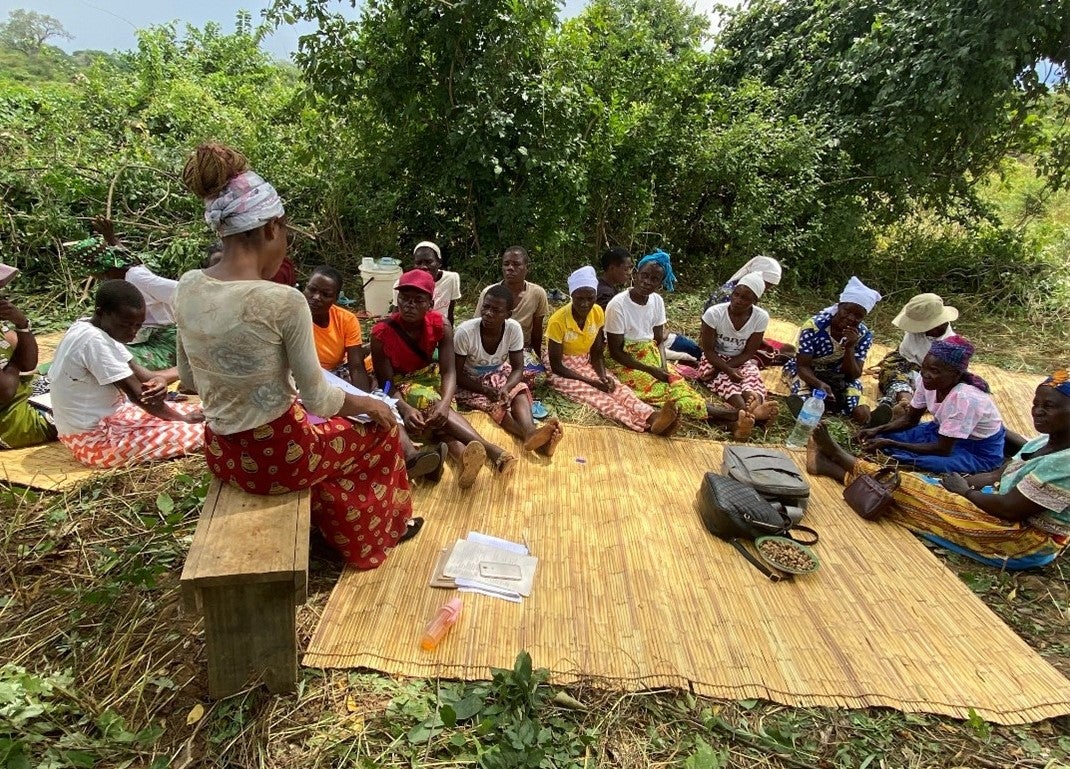Breaking the cycle of Gender-Based Violence in Zimbabwe: the work of the Institute of Women Social Workers
Date:

Gender-Based Violence (GBV) remains one of the most pressing challenges facing women and girls in Zimbabwe. Yet, amidst this struggle, Generation Equality commitment makers, like the Institute of Women Social Workers (IWSW) in Zimbabwe, are working tirelessly to break the cycle of violence, empower survivors, and challenge systemic inequalities that affect women and girls across the country.
Founded by women united in their vision of achieving gender equality and social justice, the IWSW is a youth-led feminist organization in Zimbabwe working through Generation Equality under the Action Coalition on Gender-Based Violence (GBV) that combines advocacy, education, and community-driven interventions to combat GBV. Their programs are designed to empower marginalized communities, especially women and girls, by fostering dialogue, addressing economic vulnerabilities, and advocating for systemic change.
Key Initiatives
At its core, the IWSW aims to empower individuals and foster gender equality across generations, explains Hazel Kandima, Programs Coordinator at the IWSW. The organization recognizes that addressing GBV requires a holistic approach - one that incorporates economic empowerment, psychosocial support, and education while challenging harmful cultural norms. Through initiatives like the Hurukuro for GBV Prevention Campaign, a dialogue-based approach rooted in Afrocentric principles, the IWSW fosters safe spaces for discussions on GBV, mental health, and sexual and reproductive health rights (SRHR).
The Hurukuro campaign empowers young women, girls, and LGBTQ+ populations to demand their rights and participate in feminist movements. By 2025, the initiative aims to influence policymakers to adopt laws and practices that prevent GBV. Using the Hurukuro dialogue model, the campaign has educated women on recognizing the signs of GBV, understanding its root causes, and addressing its physical and mental health impacts, such as depression and trauma. As of 2024, the program has reached over 280 participants, exceeding its target by 40%. A standout feature of the campaign is its male engagement strategy. By involving young men and boys in discussions, the IWSW ensures community-wide support for GBV prevention while also fostering sustainable change.

Recognizing that economic empowerment is a key factor in reducing GBV, the IWSW implements projects like the CLASS-WEE initiative, which provides women with access to affordable credit and business training. From community-based savings programs to mental health support and advocacy for inclusive policy change, the IWSW’s multifaceted approach aims to dismantle the barriers that perpetuate GBV and inequality.
But perhaps the most powerful testament to their impact lies in the stories of the women and girls whose lives have been transformed by these programs. Below, we share the inspiring journeys of survivors like Tariro, Betty, and the women of the Doma community, supported by IWSW work, under Generation Equality:
Sewing a Path to Independence: The Sanitary Pad Project
In the rural community of Mariga in Mbire District, Tariro’s life was met by many challenges. As a GBV survivor and mother of three, she had been abandoned by her husband and left to support her family alone. However, through the IWSW’s sanitary pad production project, funded by the NGO Hivos, Tariro’s story took a hopeful turn.
The project, designed to address critical health needs in resource-scarce communities, trained beneficiaries - primarily GBV survivors - to produce reusable sanitary pads. Equipped with hand-operated sewing machines, raw materials, and skills training, women like Tariro gained not just a livelihood but also a sense of independence.
For Tariro, the income she earned was transformative. She could afford to send her children to school and improve their quality of life, all while rediscovering a sense of purpose. The project was a lifeline for many participants, offering their first opportunity to earn money independently. This financial autonomy reduced their vulnerability to further abuse, boosted their confidence, and empowered them to mentor other women and girls in their communities.

Betty: From Survivor to Advocate
Living in Arcturus in Goromonzi District, Betty was trapped in an abusive marriage. Her husband, an artisanal miner, struggled with substance abuse, and his violent outbursts left Betty feeling isolated. Without higher education or resources to support herself, she turned to the IWSW for support. Through her involvement in IWSW’s Hurukuro for GBV campaign and participation in dialogue-based sessions, Betty gained valuable knowledge about her rights, accessed counseling, and found the strength to rebuild her life. She returned to her parents’ home, where she made the decision to focus on her education.
Today, Betty is thriving and making a difference as a community champion. She actively participates in Hurukuro sessions, sharing her journey with other women and providing support and encouragement to those still enduring violence.
Doma Women: A Collective Journey to Empowerment

In the remote Doma community of Mbire District, GBV survivors face unique challenges compounded by cultural isolation and economic hardships. To address these issues, the IWSW launched a project with funding from FIMI AYNI Fund to support indigenous women through livelihoods training and dialogue sessions.
The project’s impact was profound. Women who once felt voiceless now actively participate in income-generating activities, such as crafting and selling handmade goods. The initiative also created safe spaces for women to share their stories, learn about their rights, and build confidence. The project also fostered a cultural shift in the community. With more GBV cases being reported and addressed, awareness about gender equality has grown. The Doma women have become advocates for change, sharing their newfound skills and knowledge with others in their community.
A Vision for the Future
The IWSW envisions a Zimbabwe where GBV is no longer tolerated, and every woman and girl can live free from violence and fear, shares Hazel Kandima. This vision includes stronger policies to protect survivors, accessible mental health services, and widespread education to challenge harmful norms. The organization’s Afrocentric approach, embodied in the Hurukuro model, offers a powerful framework for fostering inclusive, community-driven solutions.
Through its holistic and innovative programs, the IWSW is not only addressing immediate needs but also laying the groundwork for lasting change. As the world observes the 16 Days of Activism against Gender-Based Violence, the work of the IWSW serves as a reminder of what can be achieved when communities come together to challenge injustice and empower survivors.